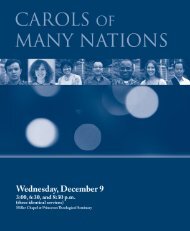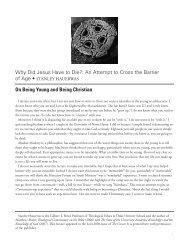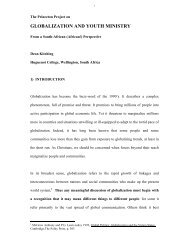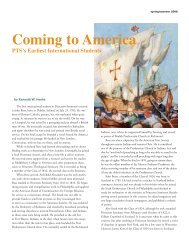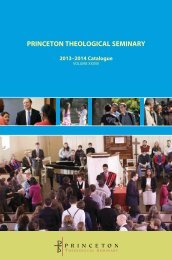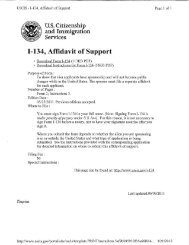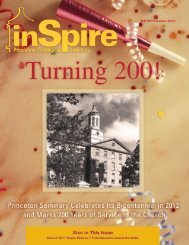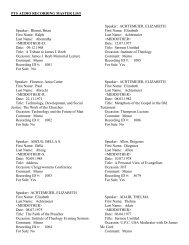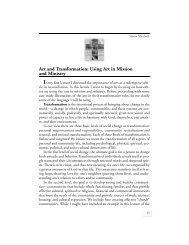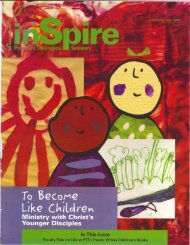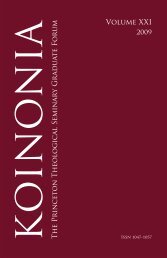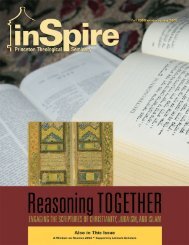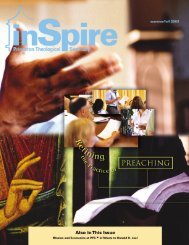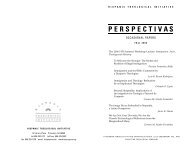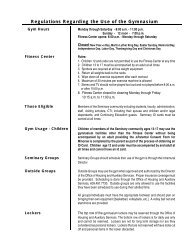Class notes - Princeton Theological Seminary
Class notes - Princeton Theological Seminary
Class notes - Princeton Theological Seminary
You also want an ePaper? Increase the reach of your titles
YUMPU automatically turns print PDFs into web optimized ePapers that Google loves.
'"<br />
fall 1997<br />
ministry with youth, urban ministry, media<br />
and computer technology, team-building<br />
and leadership development, and other areas<br />
of practical theology. In addition, the four<br />
schools where Scottish<br />
pastors get their education<br />
for ministry (St. Andrews, Aberdeen,<br />
Edinburgh,<br />
They are divinity<br />
and Glasgow) are not seminaries.<br />
faculties of secular universities.<br />
The temptation, according to Whyte,<br />
is for those schools to recruit students<br />
academic work, not for parish ministry.<br />
For example,<br />
tend not to teach students<br />
for<br />
he says, "Biblical classes would<br />
how a particular<br />
text might be exegeted for a sermon. The<br />
teaching of applied and practical theology<br />
is weak."<br />
For help in practical<br />
theology, Scotland's<br />
Board of Ministry is looking to the church<br />
in the United<br />
States and to <strong>Princeton</strong>,<br />
where the value and breadth<br />
of continuing<br />
education for ministers has been realized<br />
for decades. At last summer's Joint<br />
at St. Andrews,<br />
lectures were given on<br />
preaching in a congregational context,<br />
Institute<br />
hermeneutics for preachers, and prayer and<br />
the psalms. Robb hopes to bring <strong>Princeton</strong><br />
faculty in the areas of youth ministry and<br />
confirmation<br />
programs<br />
and catechesis to lead future<br />
for pastors and lay leaders.<br />
The sharing is not one way, though.<br />
The Church of Scotland offers American<br />
pas totS the rich liturgies of the Celtic expression<br />
of the Christian faith. "There is a growing<br />
interest in Scotland in reclaiming our<br />
Celtic heritage," says Whyte. "Our new Book<br />
of Common Order includes Celtic forms of<br />
prayer, and the third communion<br />
in the Celtic format. We are including<br />
service is<br />
in our<br />
worship and devotions prayers for the earth,<br />
and music and prayers from the Iona community,<br />
with an emphasis on nature and on<br />
simplicity. We're teaching<br />
the psalms to Scottish<br />
our people to sing<br />
tunes. We're trying<br />
to offer a fresh approach to worship, which<br />
is also a very old approach."<br />
The parish model of ministry<br />
may be<br />
another gift to American pastors according<br />
to Whyte. He believes that Scotland has<br />
something to teach about community as<br />
ministry. "Who is the church's community?"<br />
he asks. "Just its members?<br />
Or also the local<br />
schools, the local authori ties, the local businesses?<br />
The pastor can be common<br />
for these people, and the church<br />
ground<br />
building<br />
can be a community meeting place, as it<br />
were, the heart and soul of the parish.<br />
"Calvin was always aware of where<br />
he lived, in the midst of the public world,"<br />
Whyte explains. "In Scotland we try to blur<br />
the edges between the church and the world,<br />
and to offer a common ground for a community<br />
that is often quite fragmented."<br />
These discussions<br />
shape and form of ministry<br />
about the future<br />
will continue<br />
as <strong>Princeton</strong> and the Church of Scotland<br />
weave closer ties. A second Joint Institute<br />
of Theology is slated for June 3-17,1999,<br />
at St. Mary's, and a third envisioned<br />
year 2000 in <strong>Princeton</strong>.<br />
for the<br />
The goal, according<br />
to Tucker and Robb, is an annual joint<br />
continuing education event in one country<br />
or the other.<br />
"We've already received many inquiries<br />
for 1999," says Tucker. "Registration is limited<br />
to seventy-five North Americans and<br />
seventy-five<br />
as non-participants."<br />
Scots, plus spouses and children<br />
She.says there will also<br />
be an option for Americans who want to<br />
travel to Scotland<br />
jet lag, do some touring<br />
or play golf on St. Andrews'<br />
a few days early to get over<br />
in the highlands,<br />
Old Course.<br />
The <strong>Princeton</strong>-St. Mary's Institute is<br />
only one of what Robb hopes will be many<br />
opportunities for continuing education for<br />
Scottish pastors. "We want to develop relationships<br />
with other American seminaries<br />
and to encourage<br />
to offer ministers<br />
our own universities<br />
more practical courses,"<br />
he says. "But we looked first to <strong>Princeton</strong><br />
because it has such a strong program<br />
continuing education and because President<br />
Gillespie is deeply committed<br />
to our partnership."<br />
For PTS, the partnership<br />
of<br />
with Scotland<br />
will continue in other ways. <strong>Princeton</strong> students<br />
now do summer placements in churches<br />
in Ayrshire and in Strathaven<br />
Lanarkshire,<br />
a market town near Glasgow. Students from<br />
Scotland come yearly to <strong>Princeton</strong> to matriculate<br />
in many of PTS's degree programs,<br />
and the <strong>Seminary</strong> has admitted one class<br />
of Scottish D.Min. candidates, two of<br />
whose three workshops<br />
at St. Andrews.<br />
were conducted<br />
Faculty from PTS and from<br />
Scottish universities regularly ply the skies<br />
above the Atlantic<br />
in each others' classrooms<br />
to lecture and do research<br />
and libraries, as<br />
Jim Kay did on his recent sabbatical,<br />
lecturing<br />
at St. Andrews on preaching and at<br />
Glasgow on-issues surrounding the.quest __ ".."I"""l'"<br />
for the historical Jesus.<br />
So when "the clan" comes to <strong>Princeton</strong><br />
in the summer<br />
of 2000 to begin the new<br />
century in study and worship, they will bring<br />
more than bagpipes and tartans. They will<br />
bring hopes for ministry and a commitment<br />
to partnership in the continuing conversation<br />
about reaching<br />
Gospel of Jesus Christ.<br />
the world with the<br />
To receive more information about the<br />
Joint Institute of Theology in St. Andrews<br />
in the summer of 1999, including a [orm<br />
[or pre-registration, call <strong>Princeton</strong>'s Center of<br />
Continuing Education at 1-800-622-6767<br />
ext. 7990.<br />
I<br />
The entrance way to St. Mary's College of St.<br />
Andrews University, site of PTS's Joint Institute<br />
of Theology. It was in St. Andrews that Scottish<br />
reformer John Knox (inset drawing) purportedly<br />
received the call to preach the Gospel as a<br />
Protestant.<br />
inSpire· 11



